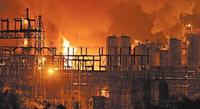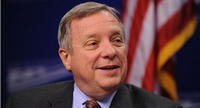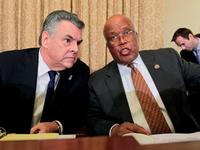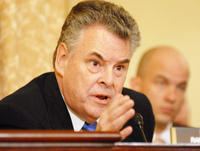-
Unions rally against proposed TSA cuts
The National Treasury Employees Union (NTEU) is rallying against two proposed amendments that would cut the Transportation Security Administration’s (TSA) budget and limit its employees’ collective bargaining rights; the union is urging the Senate to reject the two amendments in the 2012 DHS budget that the House passed; the amendment to cut $300 million from TSA’s budget comes as part of a broader turf war between two House Republican chairmen
-
-
Fate of chemical security bill uncertain

Late last month the House Energy and Commerce Committee approved legislation to extend federal regulations designed to keep chemical plants safe from terrorist attacks, but the bill’s ultimate passage is far from guaranteed; the bill that was recently passed is one of two competing House proposal — the proposals each envisions a different congressional panel monitoring chemical plant safety — and it is unclear which will make it to the floor for debate; in addition, many Democrats and some northeastern Republicans want the extension of the bill to be tied to toughening its language; further to examine what DHS is doing to secure the U.S. chemical facilities from terrorist attack, ASIS is hosting a panel on the Chemical Facility Anti-Terrorism Standards (CFATS) at ASIS annual conference in Orlando, Florida
-
-
U.S. lawmakers want reconsideration of massive aid to Pakistan

U.S. lawmakers and policy makers are expressing growing exasperation with Pakistan over its attitude toward Islamic terrorism; Rep. Ted Poe (R-Texas) plans to introduce legislation this week to freeze U.S. aid to Pakistan “unless the State Department can certify to Congress that Pakistan was not harboring America’s number one enemy”; Senator Frank Lautenberg (D-New Jersey) similarly called for more information on what Pakistan knew before they can receive the $3 billion in foreign aid requested for Pakistan in 2012, and potentially more in additional military funding; John Brennan, President Obama’s counterterrorism advisor, said it is “inconceivable” to think bin Laden did not have a support system
-
-
Senate holds Muslim civil rights hearings
Senator Dick Durbin (D-Illinois) recently presided over a Senate hearing exploring Muslim civil rights; Durbin said that the goal of the hearings was to show that most Muslim Americans “are patriotic, law abiding people who simply want to live their life as we do”; witnesses said that anti-Muslim sentiment is on the rise; from 2008 to 2009 25 percent of all complaints to the Equal Employment Opportunity Commission were Muslim bias-based; Senator Jon Kyl (R-Arizona) said he was perplexed by the need to hold specific hearings on Muslim civil rights citing the fact that most religious hate crimes in the United states are committed against Jewish people
-
-
Senate holds Muslim civil rights hearings

Senator Dick Durbin (D - Illinois) recently presided over a Senate hearing exploring Muslim civil rights; Durbin said that the goal of the hearings was to show that most Muslim Americans “are patriotic, law abiding people who simply want to live their life as we do”; witnesses said that anti-Muslim sentiment is on the rise; from 2008 to 2009 25 percent of all complaints to the Equal Employment Opportunity Commission were Muslim bias-based; Senator Jon Kyl (R - Arizona) said he was perplexed by the need to hold specific hearings on Muslim civil rights citing the fact that most religious hate crimes in the United states are committed against Jewish people
-
-
Senate proposes new $10 billion "infrastructure bank"
Several U.S. Senators are pushing for the creation of a $10 billion “infrastructure bank” to spur investment in new infrastructure and to repair America’s rapidly aging roads, power grids, and bridges; the bill could attract as much as $640 billion in private investment over the next ten years; the Obama administration has proposed a similar plan; the bank would be self-sustaining as it is not allowed to finance more than 50 percent of a project’s costs; this bill faces an uncertain future given the current Congressional budget climate
-
-
Lawmakers want cars equipped with alcohol detection devices
A bill sponsored by nine U.S. senators would provide $60 million over five years to speed up research into devices to detect alcohol on a driver’s breath, through touch on the steering wheel or through other methods; car owners could select the option when buying a new vehicle; the device would prevent the car from starting if the driver is impaired
-
-
Congress hears U.S. "failing" to confront radical Islam

Witnesses at a high-profile congressional hearing on Islamic radicalization said Thursday that America is “failing” to confront the threat posed by homegrown extremism, as lawmakers for hours traded accusations over whether the inquiry unfairly singled out Muslims; the hearing, one of the most controversial in recent memory, featured congressmen, a California sheriff, a Muslim scholar, and witnesses whose relatives had been recruited by radicals; Representative Peter King (R-New York), chairman of the House Homeland Security Committee, vowed to press ahead with more hearings, telling reporters late Thursday that the next panel would probably focus on Islamic radicalization in the U.S. prison system
-
-
On bangs and whimpers
Yesterday was the first day of the congressional hearings on Islamic radicalization in America; it is already clear that the hearings will not become important and memorable like the Army-McCarthy Hearings of the early 1950s, the Fulbright hearings of the late 1960s, or the Church Hearings of the mid-1970s; in today’s political climate, nothing can bring a conversation to an end more quickly than accusing a public figure of engaging in stereotyping ethnic or religious minorities, of ethnic profiling and scapegoating — whether or not such accusations have any merit; the Democrats on the committee went on the offensive, painting the hearings as illegitimate and making the hearings themselves the focus of attention and debate; the tone and body language of many of the Republicans on the committee showed that they grasped that this was a no-winner for them; yes, they denied charges by Democrats that this was a case of witch hunting and stereotyping, but they acted as if they were simply hoping to ride out the hearings without doing anything too disastrous
-
-
King blasts GOP for transportation security cuts

Representative Peter King (R - New York), the chairman of the House Homeland Security Committee, blasted the GOP’s plan to reduce the budget by $61 billion, citing cuts to critical anti-terror programs; the House plans to reduce spending on port security and transit facilities by $400 million, bringing total spending down to $200 million; local transit authorities say that losing federal funding would be detrimental as states and cities are struggling with their own budgets; the grants are designated for things like cameras, tunnel fortification, training, patrols, and canine teams at transport hubs and ports; proponents of the cuts believe that these programs are redundant, unnecessary, and lack sufficient oversight
-
-
Alabama fire departments receive more than $1.5 million in DHS grants
The Lanier Volunteer Fire Department in Talladega County, Alabama just announced that it received a little over $100,000 from DHS through its assistance to firefighters grant program; the department’s chief Jerry Alfred said he plans to use the funds to purchase a rescue truck; several other local fire departments also received grants from DHS including the Sycamore Volunteer Fire Department which received $231,750 and the Oak Grove Volunteer Fire Department which got $185,250; DHS plans to award $1,564,732 to eighteen fire departments throughout Alabama
-
-
On kabuki, farces, subpoenas, and theocracy
The United States is trying to persuade the UN Human Rights Council to kick Libya out (yes, Libya is a member of the council) and to order an investigation of the atrocities committed by the Gaddafi regime against anti-government protesters; trouble is, members of the council include such towering paragons of human rights as Iran, North Korea, Cuba, Burundi — and the council is controlled by a bloc of Islamic and African states, backed by China and Russia; to hope this UN body will be moved by the plight of the Libyan people is to expect too much; closer to home, Darrell Issa (R-California) promised that when he assumed the chairmanship of the House Oversight and Government Reform Committee, he would launch a subpoena campaign against the Obama administration; the campaign has now been launched; in Kentucky, the state’s homeland security department requires the department’s executive director to publicize a “dependence on Almighty God” in agency training and educational materials; atheists argue in court that this would turn Kentucky into a theocracy
-
-
Bill would allow police to turn illegal immigrants over to members of Congress
A new proposal from Texas state Rep. Lois Kolkhorst would allow law enforcement officials to drop off illegal immigrants at the offices of any U.S. senator or representative; the proposed bill only applies to illegal immigrants about to be released on bail or discharged after completing a sentence and does not detail what the U.S. senator or representative is supposed to do with them.
-
-
High-speed derailment

Sophisticated high-speed commercial trains such as France’s TGV, Japan’s Bullet trains, and China’s Shanghai Maglev that travel up to 311 mph are leaving the United States in the dust; this week, President Obama proposed a 127 percent increase on public transit spending to create jobs and stimulate the economy despite Republican plans to reduce the $1.5 trillion deficit; Republican lawmakers, governors say the development of high-speed rail should left for the private market
-
-
PATRIOT Act extended by nine months

In a move last Tuesday which surprised the Republican leadership in Congress, 26 Republicans — seven of them freshmen — voted against the extension of the PATRIOT Act, which expires 28 February; the measure was defeated when the Republican leadership attempted to force it through a fast-track procedure that required a two-thirds majority, but the vote — 277 for and 148 against — fell short; the House last night, in 275 to 144 vote under regular procedure, extended the Act by nine month; the extension includes special “roving” wiretaps, which allow law enforcement officials to use one search warrant to monitor a suspect’s calls, even if he or she skips from phone to phone; traditional search warrants only apply to a single telephone line; the Senate is yet to act on the bill
-
- All
- Regional
- Water
- Biometrics
- Borders/Immig
- Business
- Cybersecurity
- Detection
- Disasters
- Government
- Infrastructure
- International
- Public health
- Public Safety
- Communication interoperabillity
- Emergency services
- Emergency medical services
- Fire
- First response
- IEDs
- Law Enforcement
- Law Enforcement Technology
- Military technology
- Nonlethal weapons
- Nuclear weapons
- Personal protection equipment
- Police
- Notification /alert systems
- Situational awareness
- Weapons systems
- Sci-Tech
- Sector Reports
- Surveillance
- Transportation
Advertising & Marketing: advertise@newswirepubs.com
Editorial: editor@newswirepubs.com
General: info@newswirepubs.com
2010-2011 © News Wire Publications, LLC News Wire Publications, LLC
220 Old Country Road | Suite 200 | Mineola | New York | 11501
Permissions and Policies
Editorial: editor@newswirepubs.com
General: info@newswirepubs.com
2010-2011 © News Wire Publications, LLC News Wire Publications, LLC
220 Old Country Road | Suite 200 | Mineola | New York | 11501
Permissions and Policies
